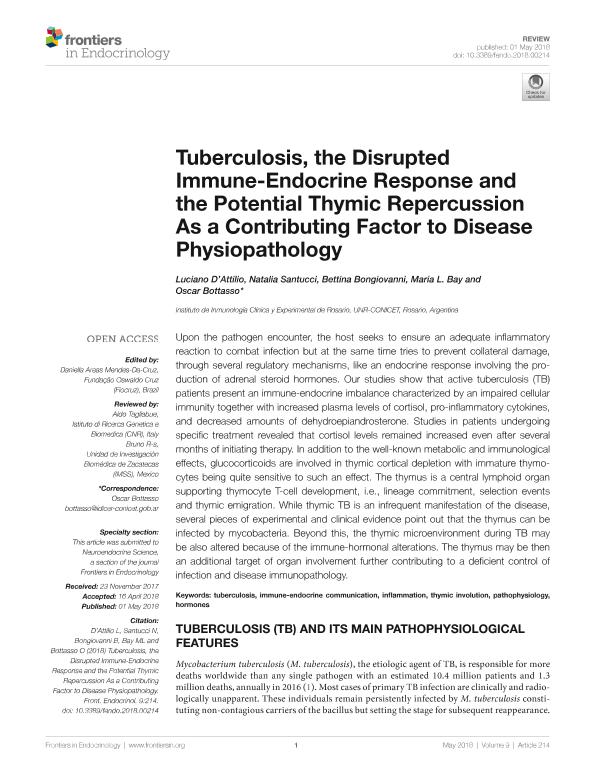Artículo
Tuberculosis, the disrupted immune-endocrine response and the potential thymic repercussion as a contributing factor to disease physiopathology
D'attilio, Luciano David ; Santucci, Natalia Estefanía
; Santucci, Natalia Estefanía ; Bongiovanni, Bettina
; Bongiovanni, Bettina ; Bay, Maria Luisa; Bottasso, Oscar Adelmo
; Bay, Maria Luisa; Bottasso, Oscar Adelmo
 ; Santucci, Natalia Estefanía
; Santucci, Natalia Estefanía ; Bongiovanni, Bettina
; Bongiovanni, Bettina ; Bay, Maria Luisa; Bottasso, Oscar Adelmo
; Bay, Maria Luisa; Bottasso, Oscar Adelmo
Fecha de publicación:
05/2018
Editorial:
Frontiers Research Foundation
Revista:
Frontiers in Endocrinology
ISSN:
1664-2392
Idioma:
Inglés
Tipo de recurso:
Artículo publicado
Clasificación temática:
Resumen
Upon the pathogen encounter, the host seeks to ensure an adequate inflammatory reaction to combat infection but at the same time tries to prevent collateral damage, through several regulatory mechanisms, like an endocrine response involving the production of adrenal steroid hormones. Our studies show that active tuberculosis (TB) patients present an immune-endocrine imbalance characterized by an impaired cellular immunity together with increased plasma levels of cortisol, pro-inflammatory cytokines, and decreased amounts of dehydroepiandrosterone. Studies in patients undergoing specific treatment revealed that cortisol levels remained increased even after several months of initiating therapy. In addition to the well-known metabolic and immunological effects, glucocorticoids are involved in thymic cortical depletion with immature thymocytes being quite sensitive to such an effect. The thymus is a central lymphoid organ supporting thymocyte T-cell development, i.e., lineage commitment, selection events and thymic emigration. While thymic TB is an infrequent manifestation of the disease, several pieces of experimental and clinical evidence point out that the thymus can be infected by mycobacteria. Beyond this, the thymic microenvironment during TB may be also altered because of the immune-hormonal alterations. The thymus may be then an additional target of organ involvement further contributing to a deficient control of infection and disease immunopathology.
Archivos asociados
Licencia
Identificadores
Colecciones
Articulos(IDICER)
Articulos de INSTITUTO DE INMUNOLOGIA CLINICA Y EXPERIMENTAL DE ROSARIO
Articulos de INSTITUTO DE INMUNOLOGIA CLINICA Y EXPERIMENTAL DE ROSARIO
Citación
D'attilio, Luciano David; Santucci, Natalia Estefanía; Bongiovanni, Bettina; Bay, Maria Luisa; Bottasso, Oscar Adelmo; Tuberculosis, the disrupted immune-endocrine response and the potential thymic repercussion as a contributing factor to disease physiopathology; Frontiers Research Foundation; Frontiers in Endocrinology; 9; MAY; 5-2018; 1-9
Compartir
Altmétricas



